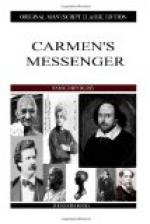It was a dark night and a damp haze thickened the gloom. Stone walls and ragged thorn bushes leaped up in the glare of the lamps and faded, but one could see nothing outside the bright beam. This was a disadvantage, because Foster could not tell where he was and much depended on his reaching the station with exactly the right time to spare. He was rather anxious about it, since his plan would be spoiled at the start if the train were late. By striking a match in the shelter of the screen, he could see his watch, but it did not seem prudent to distract John’s attention often.
By and by the walls vanished and withered heath, glistening with damp, rolled past the car. They were running through a peat moss, with a deep ditch on one side, and climbing an incline, to judge by the heavy throb of the engine. Shallow ruts, filled with water, ran on in the blaze ahead and showers splashed about the wheels. Outside the bright beam the darkness was impenetrable. Foster, however, was conscious of a pleasant thrill. If one looked at the thing in one way, he was plunging into trouble that might have been avoided; but he had been prudent long enough and found a strange satisfaction in being rash. Besides, no matter what difficulties he got into, he would be repaid by the memory of the look Alice had given him. The way the warm color crept into her face had stirred him as nothing else had done. Anyhow, he had started on the adventure and was going to see it through.
After a time, they sped across a bridge, where a burn splashed noisily down a ravine, and John asked: “How long have we got, sir?”
“Ten minutes, if the train’s punctual.”
“And where’s the other car, sir?”
Foster, whose eyes were dazzled by the match he had struck, looked round and saw a misty flash in the dark.
“About half a mile behind, I think.”
“Very good, sir. It all depends upon the train now. She’s not often late.”
The throb of the engine quickened and struck a sharper note, and Foster felt the car leap forward up the hill. Turning in his seat, he watched the flickering gleam behind and saw it grow fainter and then gradually get bright. It looked as if the pursuers had lost sight of the front car’s tail lamp and were increasing their speed.
“They’re creeping up,” he said to John, who did not reply.
Foster thought they had now reached the top of the moor, and as they swung up and down across the heathy undulations a streak of light flashed out in the distance.
“That’s the train,” he said.
“Yes, sir. You can see her for two or three miles.”
Then there was a change in the sound and motion, and Foster knew the engine was running all-out. Showers of small stones and water flew up about the wheels and the wind whipped his face, but the following light was a little nearer when he looked behind. The other car had reached the summit and it would be a close race, but he thought they could keep their lead long enough. Then he looked ahead and saw that the bright streak he had noticed had gone. The fireman had, no doubt, closed the furnace door, but the lights from the carriage windows twinkled faintly across the heath. He could not see the station, but it was obvious that he had not much time to spare.




